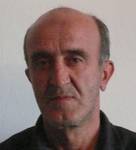Aus der REIHE MIGRATIONSGESCHICHTEN von Birgit Stegbauer (mehr InterviewpartnerInnen)
Hamzat AMAEV, 48: An approved refugee of the Geneva Convention on Refugees, he left Chechnya during the second Chechen war. He has found peace and safety in Austria with his family. Every night he dreams of being able to return to his liberated home country one day.
My home country Chechnya is a country that has hardly known peace. We Chechens have been fighting for our independence for hundreds of years, our country is soaked in the blood of many generations. I myself was born in 1965, at a time when Chechnya was a constituent republic of the huge Soviet Union. The village Samaschke which I come from is 30km from our capital city Grosny in the mountains. In the year I was born we moved to Urus-Martan which is the third largest town in Chechnya.
I went to school there, and first trained as a bricklayer, then I studied Pharmacy in Pyatigorsk. I had to do my military service for two years in the Russian army, it was compulsory for all young men in the Soviet Union and I was a long way away from my home country. Then I went home, worked and got married.
At the start of the nineteen nineties the Soviet Union collapsed and in 1991 we Chechens declared our own republic, the Chechen Republic Ischkeria. Our conflict against the Russians began in 1994 and in the first Chechen war (1994-1996) 70% of the men of our population fought, and I did too. We pushed the Russians back from our country, the losses were substantial. 42,000 Chechen children alone died!
After a break of three years the Russians attacked us again, that was the start of the second Chechen war. The Russians reconquered Chechnya and ever since our country has been a self-governing republic in Russia. But our people don’t accept that and the second Chechen war has never really ended. I didn’t fight in the second war, then I was imprisoned by the Russians for a month and a half because I’d fought in the first war on my people’s side. After that I lay low.
Russia doesn’t forgive so I worried a lot about my family, my children. I wanted to take them somewhere safe. Because it was impossible for us to legally leave for western Europe we went across Belarus to Poland and from there first to the Czech Republic and then we crossed the border illegally to Austria. I organized everything myself without smugglers, who only prey on people’s ignorance. But we had used up all our savings by then ourselves.
In Austria we sat down in the first train and told the guard: we’re asylum seekers. We need asylum. That’s how we came to the initial asylum reception centre Traiskirchen and from there to Carinthia. The life as an asylum seeker was the worst time in my life, you are at the mercy of the owner of the bed and breakfast place. If somebody has lived with and dignity and principles up to then, it’s awfully hard to endure; I compare that existence with a pet’s.
The bed and breakfast places where we were responsible for our own food were good. But in the ones that cooked for us there were products that had gone past their sell-by date and a lot of pork in particular. We couldn’t eat that as we’re Muslims. We come from a country with other practices, if someone wears shoes in our living areas or brings a dog in, it’s a catastrophe because everything’s dirty and has to be tidied up and cleaned before the next prayers. Not all bed and breakfast owners respect that.
Anyway, I want to tell you that there was also a silver lining at this time: an older lady who we asked the way in Klagenfurt did everything humanly possible for us and over time become a Granny for the children. She only ever got a ‘thank you’ from us. I will never forget her selfless deeds as long as I live.
After three years as asylum seekers we had some positive news, since then we’ve lived as approved refugees in Villach. Unfortunately my pharmacy studies weren’t recognised, I would have to study here again and then I wouldn’t be able to support my family at the same time. I’ve already worked as a car dealer, in Security. Just not in a cleaning crew, that’s not on, because we are a warring people.
I’m the chairman of Chechens in Carinthia. Our association is called MARSCHO which is Chechen for FREEDOM. If I could wish for one thing that could improve the situation of all Chechens here, it would be the prohibition of ghetto education: instead of concentrating Chechen children in one class, the classes should be mixed. Instead of accommodating noisier (Chechen) families in one apartment block, they should be offered living space outside the town centre.
Austria is the most beautiful country I know and is very similar to my home country Chechnya. We have 70% mountains too, the same landscape, the same climate. But even though this here is an eldorado for me and I have nothing but gratitude for it: Austria isn’t my country, it’s not my native land. I respect the Austrian Republic, the government, the people, the laws; I study German, I work. That’s what integration means for me. But I don’t want to assimilate. I was born a Chechen and I’d like to die as one.
23.08.2013

